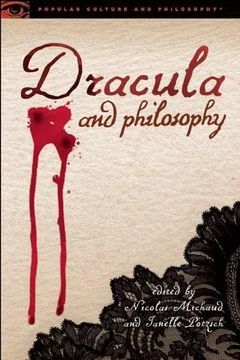Share
Dracula and Philosophy: Dying to Know (Popular Culture and Philosophy) (in English)
Nicolas Michaud
(Illustrated by)
·
Janelle Pötzsch
(Illustrated by)
·
Open Court
· Paperback
Dracula and Philosophy: Dying to Know (Popular Culture and Philosophy) (in English) - Michaud, Nicolas ; Pötzsch, Janelle
$ 13.97
$ 19.95
You save: $ 5.99
Choose the list to add your product or create one New List
✓ Product added successfully to the Wishlist.
Go to My WishlistsIt will be shipped from our warehouse between
Tuesday, May 21 and
Wednesday, May 22.
You will receive it anywhere in United States between 1 and 3 business days after shipment.
Synopsis "Dracula and Philosophy: Dying to Know (Popular Culture and Philosophy) (in English)"
In Dracula and Philosophy 24 nocturnal philosophers stake out and vivisect Dracula from many angles. John C. Altmann decides whether Dracula can really be blamed for his crimes, since it's his nature as a vampire to behave a certain way. Robert Arp argues that Dracula's addiction to live human blood dooms him to perpetual frustration and misery. John V. Karavitis sees Dracula as a Randian individual pitted against the Marxist collective. Greg Littmann maintains that if we disapprove of Dracula's behavior, we ought to be vegetarians. James Edwin Mahon uses the example of Dracula to resolve nagging problems about the desirability of immortality. Adam Barkman and Michael Versteeg ponder what it would really feel like to be Dracula, and thereby shed some light on the nature of consciousness. Robert Vuckovich looks at the sexual morality of Dracula and other characters in the Dracula saga. Ariane de Waal explains that "Dragula" is scary because every time this being appears, it causes "gender trouble." And Cari Callis demonstrates that the Count is really the Jungian Shadow archetype -- with added Shapeshifter elements -- in the journey of Mina Harker, heroine/victim of Stoker's novel, from silly girl to empowered woman.
- 0% (0)
- 0% (0)
- 0% (0)
- 0% (0)
- 0% (0)
All books in our catalog are Original.
The book is written in English.
The binding of this edition is Paperback.
✓ Producto agregado correctamente al carro, Ir a Pagar.

